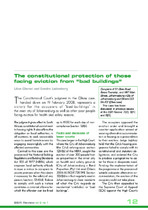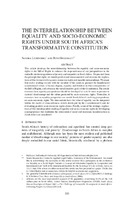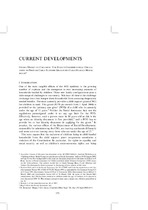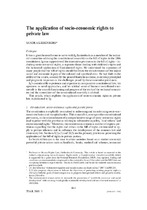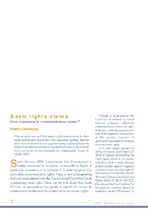Search
Now showing items 11-15 of 15
The constitutional protection of those facing eviction from “bad buildings”
(ESR Review, 2008)
The Constitutional Court’s judgment in the Olivia case, handed down on 19 February 2008, represents a victory for the occupiers of “bad buildings” in the inner city of Johannesburg as well as other poor people facing ...
The interrelationship between equality and socio-economic rights under South Africa's transformative constitution
(South African Journal on Human Rights, 2007)
This article develops the interrelationship between the equality and socio-economic rights in the Bill of Rights to enhance the responsiveness of our jurisprudence to the mutually reinforcing patterns of poverty and ...
Giving money to children: the state's constitutional obligations to provide child support grants to child headed households
(South African Journal on Human Rights, 2004)
One of the most tangible effects of the HIV epidemic is the growing number of orphans and the emergence in ever increasing amounts of
households headed by children. These new family configurations pose a wide range of ...
The application of socio-economic rights to private law
(Journal of South African Law, 2008)
The constitution is explicitly committed to redressing and transforming socio-economic exclusion and marginalisation. This is manifest, amongst other constitutional provisions, in the entrenchment of a comprehensive range ...
Basic rights claims How responsive is ‘reasonableness review’?
(ESR Review, 2004)
South Africa’s 1996 Constitution (the Constitution) is widely renowned for its holistic, inclusive Bill of Rights. A particular innovation is its inclusion of a wide range of fully justiciable socio-economic rights. There ...

